|
| Author |
Message |
Viking
Member
|
# Posted: 20 Sep 2012 06:27pm
Reply
Guys, I was reading a thread some months ago here regarding portable (propane) heating devices such as Black Cat, Mr. heater, etc. The consensus seemed to be that these devices are too dangerous to be used inside a small cabin (or any cabin for that matter) due to the carbon monoxide hazard. This is especially true when sleeping..
I think I may have come up with a solution to this. What do you think?
By all logic, the heater should be burning up oxygen on the outside of the cabin, and the duct runs warm heated air through a hole into the cabin. You can feel that warm air is exiting the duct at the end, and it should be enough to maintain some level of heat inside a small unit. I have also bought an adapter hose that allows the portable heater to connect to a normal sized bbq cylinder. Having a large propane cylinder allows you to keep using the heater for extended periods of time without having to keep changing the canister constantly.
Thoughts?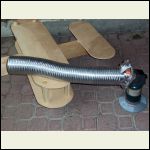
102_1619.JPG
| 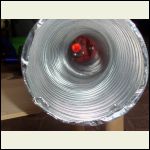
102_1620.JPG
| 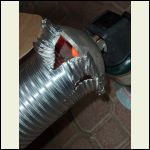
102_1622.JPG
| 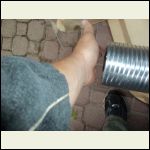
102_1624.JPG
|
|
|
brokeneck
Member
|
# Posted: 20 Sep 2012 10:28pm
Reply
Get a CO Detector -please !!!
|
|
MtnDon
Member
|
# Posted: 20 Sep 2012 10:44pm
Reply
It's not just a consensus that people should not use unvented appliances for heating; there is science behind it.
Carbon monoxide is produced by incomplete combustion. With a space heating appliance that can occur because the mixture of propane and air is too rich in fuel, too much propane for the amount of oxygen in the air. A common reason for a rich mixture is a higher elevation without compensating by installing a smaller gas orifice. The same rich mixture can occur if the intake air supply is restricted. It seems to me that you may be flirting with disaster by using such a pipe. How can we know sufficient air is getting to the burner? A CO monitor will help with that of course. A working CO monitor should be a standard piece of equipment in any building / room that uses a burning fuel to supply heat for space warming, water heating or cooking.
Just in case anyone missed it, CO is colorless, odorless and mixes readily in air. And hemoglobin (in your blood) loves CO more than oxygen; hemoglobin will pickup CO instead of oxygen given any CO in the air supply. Not having oxygen, or enough of it, is bad for us.
CO is great tool for a method of committing suicide.
|
|
brokeneck
Member
|
# Posted: 20 Sep 2012 10:52pm
Reply
Thanks MtnDon -- I agree wholeheartedly and couldn't have said it better -- and my worry is real --to support my cabin addiction I work for The Denver Paramedics ...
|
|
Viking
Member
|
# Posted: 20 Sep 2012 11:01pm
Reply
I hear your worries, but from what I have learned about propane heaters is that they burn up all the oxygen inside a space, therefore causing elevated levels of cm. If the burner is located outside in the open and the mouth of the duct has open holes to allow for oxygen to enter the apparatus, then it would seem plausible that it would not effect the air inside the enclosure.
I will have to run some tests, I do have a cm detector and will also be testing the levels of cm coming through the other end of the duct.
Viking
|
|
Viking
Member
|
# Posted: 20 Sep 2012 11:04pm
Reply
Here is something that I found on the net, similar in concept to mine.
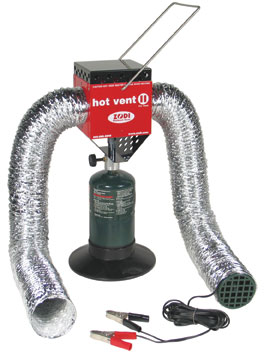
|
|
MtnDon
Member
|
# Posted: 21 Sep 2012 12:53am - Edited by: MtnDon
Reply
My point was/is how do you know that no carbon monoxide is traveling up the pipe to be released in the room?
I am less worried, much less worried, about the device using up all the oxygen in the room. It is probably "air leaky" anyhow. Burning up the oxygen is bad. But the presence of CO is worse. And it is the CO that worries me. CO is nasty deadly stuff. Our bodies will latch onto any CO in the air before it will latch onto oxygen. And then to make matters worse the body hates to let go of the CO. It does not want to give up the CO and take on O2. A body can actually reach the point where there is sufficient CO in the blood that even if nothing but pure O2, pure oxygen is supplied, the body will not give up the CO fast enough to make it possible to sustain life. All the machines become useless. And you die.
Good friends almost died when their propane refrigerator dumped loads of CO into their cabin. A couple of hunters, guys I only knew of casually, died in a canvas tent when a wood stove, one of those light weight expedition stoves, malfunctioned. And friends of mine had friends of theirs die in a tent with a small propane heater involved. I'd rather be cold than dead. You can do what you want. And further to that my father almost died when the exhaust system on the truck he was driving CO'd him. He was lucky that he got ill enough to stop at a medical clinic complaining of headaches and nausea.
And BTW, the correct and proper abbreviation for carbon monoxide is CO, not cm. CO is the universally recognized shorthand used worldwide. You are not the only one making the error; I have seen others make the same error. If you Google CO it comes up with Colorado, China Blood Corp, carbon monoxide and a few other things. If you Google CM there are a variety of hits but nothing on carbon monoxide.
If I sound P-O'd it's not personal. I simply get tired of recounting the potential dangers of CO and getting reasons why the other person has an idea that will make them safe in return. For reasons re-read the second and third paragraphs.
|
|
MtnDon
Member
|
# Posted: 21 Sep 2012 12:57am - Edited by: MtnDon
Reply
Maybe you are completely safe. I don't know. The conservative side of me says why take a chance. I've never used a tent heater / portable heater. We camp a fair amount; tents and back of a SUV or the shell on a pickup truck. We have winter sleeping bags and summer bags; sometimes take both along. I'm a crotchety 66 and hope to see 86 at least.
|
|
|
dvgchef
Member
|
# Posted: 21 Sep 2012 07:14am
Reply
After a week in my well insulated cabin last winter with a portable heater running about 6 hours per day I got "the headache." I opened all the windows, took a walk, returned to the cabin and packed up.
I will still use my propane heater - sparingly - but I won't go to the cabin during the coldest time.
Good luck, and be careful. Let us know what you discover.
|
|
razmichael
Member
|
# Posted: 21 Sep 2012 07:53am
Reply
"Here is something that I found on the net, similar in concept to mine"
Viking, The picture of the zodi heater is not the same as the thing you are doing. Read the description of the product and it has a sealed heat exchanger so the combustion process is separate from the heated air. This is portable design of a fully vented type heater. From personal (well - someone I know well), I fully support all the other concerns posted on the CO risks - especially trying to modify a heater to do something it is not designed to do and then assuming it is safer. Be careful. Along with a CO detector add a gas detector as well if dealing with propane (of course you already have a smoke detector).
|
|
trollbridge
Member
|
# Posted: 21 Sep 2012 11:38am
Reply
Once you've experienced actually being poisoned by CO you will not want it to ever happen again...that is if you are lucky enough to still be around 
Just using the hair dryer last winter outside but plugged into the generator for maybe 4-5 minutes made me feel sick as a dog-headache and chest pain and nauseousness and the thing is, it takes quite a while to go away-it's not like once you get some fresh air it immediately makes it better. I was too lazy to find an extension cord and figured it wouldn't take long-probably was blowing it right into my own face-stupid!
I appreciate and understand your desire to "invent" something that will work safely for you, but in the end it is just WAY better to spend the money to be safe 
|
|
MtnDon
Member
|
# Posted: 21 Sep 2012 12:53pm
Reply
It seems the Zodi heater shown above is discontinued. Looks like it was about $200. Not cheap but then what's a life worth. Too bad really as that is the only way to heat and so it safely; no cracked windows, no worries about what may happen when one is sleeping. I just hate the thought of waking up dead, if you know what I mean. 
|
|
DaJTCHA
Member
|
# Posted: 21 Sep 2012 01:05pm - Edited by: DaJTCHA
Reply
If you're going to design something like this you need to think (mentioned above) about it in terms of two sealed systems. One system will blow fresh air into your cabin or small space that is heated along the way by another system that is completely sealed off from the first. So, how is this accomplished? A heat exchanger is the key. (replace the steam and fluid with "external air" and "internal air" flows)

And, you need to establish (out of pure safety and life/death reasoning) that propane combustion is always incomplete. Maybe not the case, but let's just pretend this to be true. No matter where the combustion is occurring, it is incomplete and will contain deadly CO.
Re-engineer the design where as the propane burner is heating a "radiator" of sorts that has the air of your cabin flowing through it. That way, you'll never have to worry about the combustion components being introduced into your space and you'll never reduce the level of O2 either. You can warm the O2 rich air in your cabin as much as you like and the only one to blame for changing the composition of the internal air is you! LOL!
|
|
Viking
Member
|
# Posted: 26 Sep 2012 01:42pm
Reply
Guys, we tried the contraption on the weekend and it worked amazingly well. I had a CO detector as recommended and it never went off so much as a beep. I even placed the CO detector in front of the duct where the warm air was coming in. No headaches, no indication of any problems and we had the unit running for the night while we were sleeping. Of course, I don't recommend that anyone else does this as you are doing it at your own risk. Always ensure that here is some ventilation and O2 coming into the trailer/cabin.
Viking
|
|
EganCreek
Member
|
# Posted: 7 Dec 2017 03:16pm
Reply
Does anyone have an experience using a Zodi Heater?
I'm thinking about buying one to heat a 10x10 cabin?
|
|
groingo
Member
|
# Posted: 11 Dec 2017 05:50pm
Reply
Viking
Been down the road you are on, first DON'T trust the CO detector if it is a consumer product.
I had three different brand CO and CO2 detectors and had our fire marshal and health department check them out and none went off.
They tested the air in my cabin and their expensive laboratory grade Raytek detectors did not go off as well, they said the levels were too low to register.
Also, the best most effective tool is a blood gas analyer that simply clips onto the end of your finger, it gives your blood oxygen levels and pulse, this is a very useful tool because if your getting CO in you system your oxygen levels will show lower, much more sensitive and accurate than detectors.
Been using Propane heat from a non conventional heater for four seasons and it works very well, but due to the ever rising cost of propane around here and poor quality of it I use pro heat only as backup to my electric Infrared heat.
Always keep a window cracked and keep on experimenting!
|
|
fiftyfifty
Member
|
# Posted: 12 Dec 2017 09:31am
Reply
"Always keep a window cracked and keep on experimenting!"
Wow, "keep on experimenting" is the last thing I would recommend. And keeping a window cracked does next to nothing in terms of reducing CO risk. A teacher I had when I was a kid was CO poisoned in a garage with the garage door wide open.
|
|
Jebediah
Member
|
# Posted: 12 Dec 2017 01:54pm - Edited by: Jebediah
Reply
Edit I just noticed the date on this forum, its 2012;
30yrs in the Fire Service at it never ceases to amaze me the things people will do. Just promise me one thing, if you have children don't use this if they are in your cabin....As they don't have a choice when an adult running the show...
I have two vented propane wall heaters I won't run those while I'm sleeping and they have built in safety mechanisms....
|
|
|

